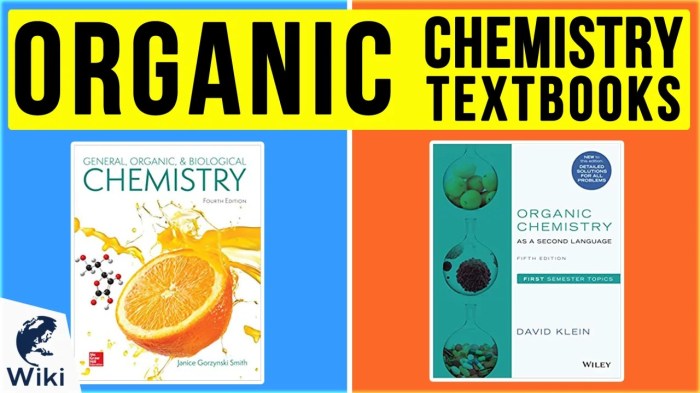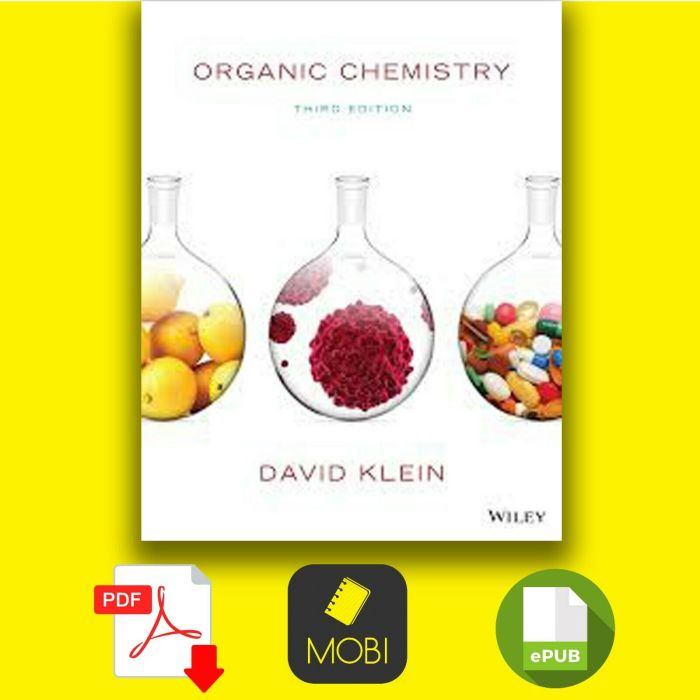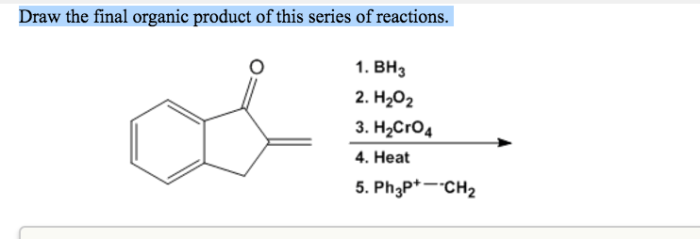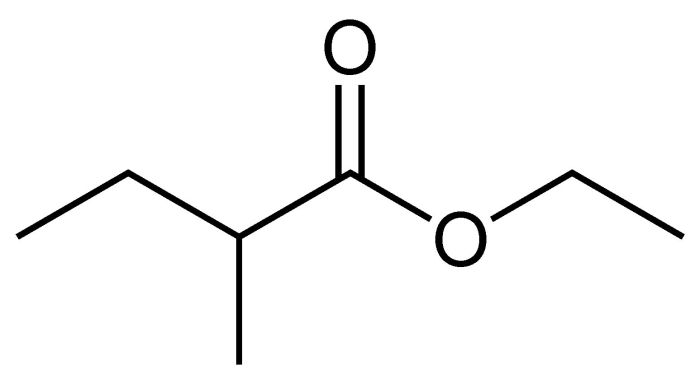David klein organic chemistry third edition – David Klein’s Organic Chemistry, Third Edition, is an authoritative and comprehensive textbook that provides a thorough grounding in the fundamental principles and applications of organic chemistry. With its clear and engaging writing style, this book guides students through the complexities of the subject, empowering them with a deep understanding of organic chemistry’s key concepts, reactions, and applications.
This third edition has been meticulously revised and updated to reflect the latest advancements in the field. It features new and expanded content on topics such as stereochemistry, spectroscopy, and biological applications, ensuring that students have access to the most current information available.
1. Key Concepts

Organic chemistry, as presented in David Klein’s third edition, encompasses the study of the structure, properties, and reactions of organic molecules. These molecules contain carbon and are the building blocks of life and a vast array of materials.
The key principles of organic chemistry include:
- The carbon atom and its unique ability to form covalent bonds.
- The tetrahedral geometry of carbon and the resulting molecular shapes.
- The concept of hybridization, which explains the bonding behavior of carbon.
- The principles of resonance, which describe the delocalization of electrons.
- The concept of functional groups, which are specific atoms or groups of atoms that impart characteristic properties to organic molecules.
2. Organic Reactions
Organic reactions are the processes by which organic molecules are transformed into new molecules. The third edition of David Klein’s textbook covers a wide range of organic reactions, including:
- Nucleophilic substitution reactions, in which a nucleophile attacks an electrophile, replacing a leaving group.
- Electrophilic addition reactions, in which an electrophile adds to a double or triple bond.
- Elimination reactions, in which a leaving group and a proton are removed from an organic molecule.
- Rearrangement reactions, in which the atoms of an organic molecule are rearranged to form a new molecule.
Each type of reaction has its own unique mechanism and set of reagents. Understanding these reactions is essential for understanding the synthesis and reactivity of organic molecules.
3. Stereochemistry

Stereochemistry is the study of the three-dimensional arrangement of atoms in molecules. In organic chemistry, stereochemistry is important because it can affect the properties of molecules, such as their reactivity and biological activity.
The third edition of David Klein’s textbook covers the following aspects of stereochemistry:
- Molecular chirality, which is the property of a molecule that makes it non-superimposable on its mirror image.
- The different types of stereoisomers, including enantiomers and diastereomers.
- The methods for determining the stereochemistry of molecules.
- The applications of stereochemistry in drug design and other areas.
4. Spectroscopy

Spectroscopy is the study of the interaction of electromagnetic radiation with matter. In organic chemistry, spectroscopy is used to identify and characterize organic compounds.
The third edition of David Klein’s textbook covers the following spectroscopic techniques:
- Nuclear magnetic resonance (NMR) spectroscopy, which is used to determine the structure of organic molecules by analyzing the magnetic properties of their nuclei.
- Infrared (IR) spectroscopy, which is used to identify functional groups in organic molecules by analyzing the absorption of infrared radiation.
- Ultraviolet-visible (UV-Vis) spectroscopy, which is used to determine the electronic structure of organic molecules by analyzing the absorption of ultraviolet and visible light.
These spectroscopic techniques are essential for understanding the structure and reactivity of organic molecules.
5. Synthesis and Reactivity: David Klein Organic Chemistry Third Edition
Organic synthesis is the process of creating new organic molecules. In the third edition of David Klein’s textbook, the following aspects of organic synthesis are covered:
- Retrosynthesis, which is a method for planning organic syntheses by working backwards from the desired product.
- Functional group transformations, which are reactions that convert one functional group into another.
- The factors that affect the reactivity of organic molecules.
Understanding organic synthesis is essential for the development of new drugs, materials, and other products.
6. Biological Applications
Organic chemistry plays a vital role in biological systems. The third edition of David Klein’s textbook covers the following biological applications of organic chemistry:
- The role of organic molecules in metabolism, which is the process by which cells convert food into energy.
- The design of drugs, which are organic molecules that are used to treat diseases.
- The chemistry of natural products, which are organic molecules that are produced by living organisms.
Understanding the biological applications of organic chemistry is essential for understanding the functioning of living organisms and for developing new medical treatments.
Expert Answers
What are the key features of David Klein’s Organic Chemistry, Third Edition?
David Klein’s Organic Chemistry, Third Edition, is known for its clear and engaging writing style, comprehensive coverage, and up-to-date content. It features new and expanded content on topics such as stereochemistry, spectroscopy, and biological applications.
Who is the intended audience for David Klein’s Organic Chemistry, Third Edition?
David Klein’s Organic Chemistry, Third Edition, is suitable for undergraduate students majoring in chemistry, biochemistry, and related fields. It is also a valuable resource for professionals seeking to refresh their knowledge of organic chemistry.
What are the benefits of using David Klein’s Organic Chemistry, Third Edition?
David Klein’s Organic Chemistry, Third Edition, provides students and professionals with a deep understanding of the fundamental principles and applications of organic chemistry. Its clear explanations, engaging writing style, and comprehensive coverage make it an ideal choice for anyone seeking to master this complex and fascinating subject.

